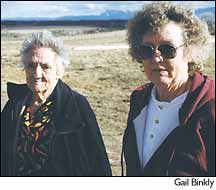Feb. 17, 2000
BY GAIL BINKLY Nearly a half-century ago, when Marie Sharp moved to her farm seven miles northeast of Cortez, there was little but a vast pool of darkness around her at night. "When we first moved here, you could see about two of these vapor lights outside," Sharp recalled Friday as she looked over her 80 acres of farm land. "Now there’s lights all over. It’s like a town out there." It was the sense of residential growth pressing in upon her that led Sharp, now 82, to place her property under the protection of a conservation easement with the Montezuma Land Conservancy. Under the terms of the agreement, she will continue to live on the land and it will remain in agriculture, but it can’t be subdivided or sold. "That’s what I wanted," Sharp said. "I don’t want to see it split up. It’s little enough right now." The recently completed easement is the second for the conservancy, a non-profit organization formed in 1998 to help local landowners conserve open space through such voluntary measures as conservation easements. The easements are legal arrangements under which landowners transfer their development rights to a land trust or government agency. Easements cannot be bought or sold and usually exist in perpetuity. In many cases, the easements provide financial benefits to owners and their families, either through income-tax breaks (the development value of the land can be counted as a charitable deduction) or through lower estate taxes when the property is transferred to heirs. The Montezuma Land Conservancy’s first easement, done in July 1999, was on a 220-acre farm belonging to Sharp’s daughter and son-in-law, Sammie and Ray Coulon. "She had the idea first," Sammie Coulon said of her mother. "We’d both read in farm magazines about easements in other parts of the country, and it just sounded like a good idea." Kevin Essington, director of the Montezuma Land Conservancy, said he was "ecstatic" that Sharp had decided to preserve her property for the future. "You can see this is an ideal tract for development, so close to town," he said. Sharp knows that she could have turned a tidy profit by subdividing, but she said accumulating wealth isn’t her primary motivation. "I’ve never gone hungry in my life," she said. "Money don’t mean that much to me that I’d let people build right up to my door. I like to have room to move around." Sharp was born in Denver, but her mother was a native of the Disappointment Valley, and the family returned there when Sharp was 2. She never moved out of the Four Corners area again. Since 1952, she has been living in her small home with its broad views of the mesa and the Montezuma Valley. She leases her land to the Coulons, who grow alfalfa and grass and use the pasture for grazing cattle. Deer are frequent visitors to her farm, as are bald eagles that like to sit in tall trees and swoop down on hapless prairie dogs. Sharp prefers the sight of open spaces to small residential tracts with monster dream homes. "As long as I can keep it from being chopped up into two- or three-acre places with all those mansions, I will," Sharp said emphatically. "Pretty quick you’re going to be able to step right from one house to the other in this county." Sharp’s easement will be held by the La Plata Open Space Conservancy and monitored by the Montezuma Land Conservancy in a cooperative venture. The organizations cooperated on a similar venture last year and have plans for more. |
||
Copyright © 2000 the Cortez Journal. All rights
reserved. |
